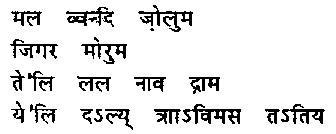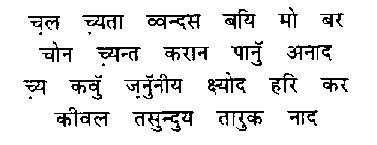Saints
& Sages

Lalla
- Ded
Like
all great saints, Lalla Ded, also known as Lalla-Maj
& Lalleshwari, came upon scene to redress the
sufferings of Kashmiris. Through her Vaakhs, she
brought solace to the bruised hearts of the people
among whom she lived.
The
life of Lalla Ded is shrouded in myth, miracle and
legend. Miracles and legends have been associated
with Lalla Ded from her very birth. Some of the
legends are :-
a)
In her in-laws, she was known ‘Padmavati’. She
was cruelly treated by her mother-in-law. She would
serve food to Lalla, spreading a thin layer of
cooked rice, to cover ‘Kajwat’ (a lump of
stone). Once she was asked by the ladies at the
river bank, what she had for dinner on previous
night. That night there was a great feast at her
inlaw’s place. Lalla replied, “Hond maran ya
kath, Lalli nilawath tsali no zanh”.
b)
Once, when after her meditation, as usual, at
‘Nata Keshava Bhairva’, with pitcher of water on
her head, Lalla entered the compound of her house.
Her husband, in his rage, struck the pitcher with a
stick. The pitcher broke and water stood frozen on
her head till she filled all pots in the kitchen.
She threw what remained of it, outside, which
surprisingly, collected into pond. That pond came to
be known as “Lalla Trag” - The pond of Lalla.
c)
It is said in “Tarik-i-Hussaini” that Nund Rishi
was once breaking into a house, as ordered to do so
by his step brothers, who were thieves by
profession. Lalla passed by, rebuked Nunda and told
him that he will not get anything at poor man’s
house. She advised him to go to big house of God and
break into it, perhaps in that way, he might obtain
something worthy and great. After that Nunda
rishi gave up stealing and entered a cave at ‘Kaimuh’,
for penance and prayers.
d)
Once Siddha Shrikantha was having bath in the river.
He noticed, little above, Lalla was scrubbing the
outside of an earthen pot. He remarked, “What use
this scrubbing the pot outside, when dirt inside is
not removed.” Lalla retorted, “What
profits it to bathe to cleanse the body while the
inner Self is not purified.?”
The
Yogeswari is called Lalla because she was seeker of
truth. ‘Lal’ is a Kashmiri derivative of
Sanskrit ‘Lalasa’ meaning ‘to obtain’, ‘to
long for’, ‘to seek’. She says in the
following Vakh, that she was called ‘Lalla’
because she sought the truth, after burning up the
impurities of her mind and resigned completely to
Him:

The
great saint, ‘Lalla-Maj’ was born to help
overcome troubles, pains and human insanity. Her
sayings act as a healing balm to people, which stand
true and good for all times. In the warring world of
today, especially Kashmir, her Vaakhs have
relevance, more than ever before. In the following
Vaakh, she brings message of hope and encourages not
to give way to fear and despondence. “The Lord is
there to worry for you. Be patient and wait for His
grace-His divine call”.

Nund
Rishi
Sheikh
Nur-Ud-Din Rishi, commonly knows as Nund Rishi -
Nund Riyosh, was born in 1375 A.D. at village Kaimuh,
district Anantnag, in the home of Salar Sanz, a
Hindu, who later embraced Islam & was renamed
Sheikh Salar-ud-Din. The great Nunda Rishi’s
spiritual eminence and moral rectitude won him the
designation of Sheikh-Ul-Alam.
There
is saying current even today in Kashmir - Yina
mandachhokh na, chena chhukh mandachhan (Ashamed you
were not of being born, why should you be shy of
suckling now). It is said when Nunda Rishi was born,
he would not suckle at his mother’s breast till
Lalla Ded unexpectedly appeared at the house, patted
the baby and with these words asked him to draw milk
from the breast of his mother, which he did.
The
Sage started life n.mp3ally. He married and had two
issues. But the things around him made him intensely
sad. He took to caves for penance and meditation. He
lived for 12 years in wilderness. Thus nature became
the Nund Rishi’s first teacher. Later in life, he
is said to have received the blessings of four
Muslim divines of high spiritual attainments.
He
preached non-violence, non-killing and adopted the
severe self discipline. His poetry has glow of
spirituality around it. He also talks of inequality,
injustice, tyranny and social evils. He always
stressed the unity of Hindus and Muslims. To serve
the mankind, is noblest service and way to God. He
made his poetry the message of his faith, love and
brotherhood.
He,
in his Shruks, talks of the shephered who followed
Siva (Lord) and entering H.mp3ukh along with the
Lord, disappeared. Nund Rishi prays - “Oh Lord,
bestow a similar boon upon me”.
Nund
Rishi craves for that what was attained by Lalla Ded
and cries :
Padmanporachi
Lalei
Tami
galei amrit piva
Svai
sani ti avtar lvalei
Tithuy
me var dita Diva
(It
was Lalla of Padmanpora, who drank, in long draught,
nectar Divine. A beloved Avtar She was to us too.
May thou Lord bestow a similar boon upon me.)
Roopa
Bhavani
Roopa
Bhavani shines as a bright star in the galaxy of
mystic saints. She was born in 1624 A.D. to Sampat
Majya, wife of Madhav Joo Dhar. Madhav joo was a
pious scholar, who was great bakht of Godess Sharika
and lived at Safa Kadal, Srinagar. Roopa Bhavani’s
father was her guru. She was married to Hiranand
Sapru. Her married life was unhappy. Her
mother-in-law, Samp Kuj and her husband, always
found fault with her. She renounced the worldly life
and wandered to a number of places in the Valley.
Roopa
Bhavani did meditation and intense tapasya in
Manigaam near Lar, in Waskura near Gandherbal and in
Cheshma-i-Sahbi near Chashma Shahi. In the year 1721
A.D., Roopa Bhavani’s soul took flight for ever.
Kashmiri Pandits, out of great reverence and
respect, keep a fast on her death anniversary, which
is known as ‘Sahib Saptami’.
Roopa
Bhavani used Kashmiri as medium for expressing her
thoughts and teachings knows as ‘Shruk’ (Shalok).
She has enunciated the same truth what she
visualised through her mystic approach, Sadhana and
Yoga. She recognises the grace of the great Shiv
Yogini Lalleshwari, Guru Madhava and Shiva :

She
gave message of peace, love and brotherhood. She
aff.mp3ed that all are equal in the eyes of God. For
attaining Samaadhi, she says, “The seeker has to
undergo the penance, self discipline and
devotion.” She mentions that man is accountable
for his own K.mp3a - deeds, as he has the freedom of
choosing his course of action. She says, “Take it
for certain that Lord is very close to you, sitting
in your vessel (body). You need not go anywhere in
search of the Lord.” Her blessings are filled with
deep love, compassion and hope. She says :

(The
darkness of ignorance will vanish, and the Sun of
knowledge will lead us to ‘Sahaj-Vichar’ - the
essence of Divine Knowledge.)
| 